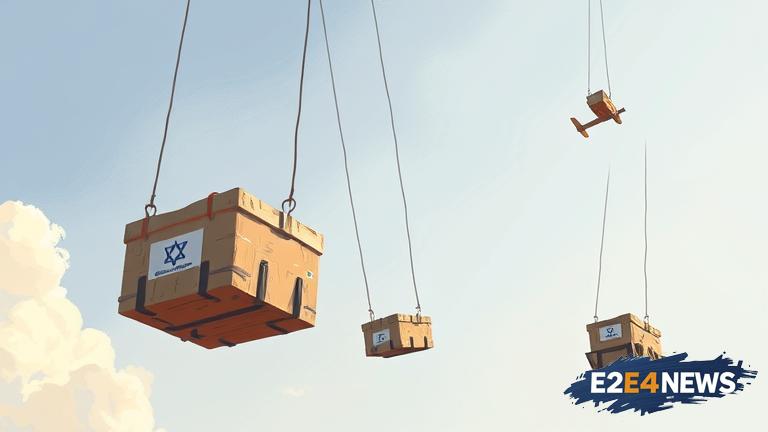The Israeli military has initiated a campaign to air-drop humanitarian aid packages in the Gaza Strip, in an effort to provide essential supplies to the civilian population. The move comes as the conflict between Israel and Hamas continues to escalate, resulting in significant humanitarian concerns. The aid packages, which include food, water, and medical supplies, are being dropped in areas deemed safe by the Israeli military. The initiative is part of a broader effort by Israel to distinguish between civilian and military targets, and to minimize harm to non-combatants. Despite these efforts, the conflict has resulted in significant damage to infrastructure and civilian casualties. The Gaza Strip has been under a blockade by Israel and Egypt since 2007, which has severely limited the flow of goods and people into the territory. The humanitarian situation in Gaza has been further exacerbated by the ongoing conflict, with many residents lacking access to basic necessities like food, water, and electricity. The air-drop campaign is seen as a positive step by some, who argue that it demonstrates Israel’s commitment to minimizing harm to civilians. However, others have criticized the move, arguing that it is insufficient to address the scale of the humanitarian crisis in Gaza. The conflict between Israel and Hamas has been ongoing for several years, with periodic outbreaks of violence. The most recent escalation began in response to rocket attacks launched by Hamas into Israeli territory. Israel has responded with airstrikes and artillery fire, resulting in significant damage to infrastructure and civilian casualties. The international community has called for a ceasefire and an end to hostilities, but so far, a lasting resolution has not been achieved. The humanitarian situation in Gaza is likely to continue to deteriorate unless a peaceful resolution can be found. In the meantime, efforts like the air-drop campaign may help to alleviate some of the suffering, but a more comprehensive solution is needed to address the root causes of the conflict. The Israeli military has stated that it is committed to minimizing harm to civilians and to distinguishing between military and civilian targets. However, the reality on the ground is often more complex, and civilian casualties have been a tragic consequence of the conflict. The use of air-dropped aid packages is a relatively new tactic, and it remains to be seen how effective it will be in addressing the humanitarian needs of the civilian population. Some have raised concerns about the safety of the air-drop campaign, given the risk of misidentification or accidental targeting of civilians. Despite these concerns, the Israeli military has stated that it is taking all necessary precautions to ensure the safety of civilians. The international community is watching the situation in Gaza closely, and there are calls for a more robust response to the humanitarian crisis. The United Nations and other humanitarian organizations have been working to provide aid to those affected by the conflict, but their efforts are often hindered by the blockade and other restrictions. In the long term, a lasting resolution to the conflict will require a comprehensive and negotiated settlement between Israel and the Palestinian authorities. Until then, efforts like the air-drop campaign may help to alleviate some of the suffering, but a more fundamental solution is needed to address the root causes of the conflict. The situation in Gaza remains volatile, and the humanitarian needs of the civilian population are significant. The air-drop campaign is a small step towards addressing these needs, but much more needs to be done to bring about a lasting resolution to the conflict.
